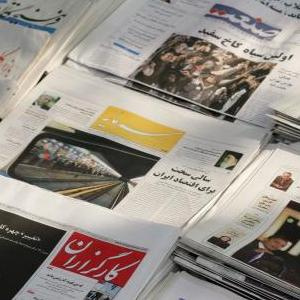Tehran's Daily Newspaper Review

Central Bank Chairman Mahmoud Bahmani boasted of the government’s exceptional success in taming inflation. Iran also quoted Bahmani speaking of a 3.17 percent inflation rate at the present, while some analysts predicted the rate to move beyond 60% after the government’s decision to wean the economy off the subsidies. Following protests against the endangered geological state of Urmia Lake, the government has decided to enforce the plan rejected by Majles, i.e. feeding the lake from the Aras River. The newspaper’s editorial, titled “fear”-- partly philosophical, partly political-- argued that underdeveloped nations have dispelled the fear instilled by more powerful countries.
Jomhouri-ye Eslami chose a controversial headline, quoting the Judiciary Speaker and former minister of intelligence (in Ahmadinejad's first administration) Mohseni Eje’i, as saying that “the judicial apparatus is under pressure for following the cases of high-ranking corrupt figures.” He also expressed sorrow over the claims that the parliament and the Judiciary do not cooperate to eradicate corruption. Jomhouri-ye Eslami reported of criticisms against the current mechanism of setting interests rates in Iranian banks, expressed by Islamic jurisprudents in the Islamic Banking Conference held in Tehran on Monday. The newspaper’s editorial “Turkey’s flexibility and adverse effects” argued that the recent UN report on Israel's performance in the Mavi Marmara aid flotilla proves that Ankara does not gain much from intimate relations with West.
Kayhan’s top headline was the strong protest of Turks to Erdogan for the visit paid by Bahraini Khalifa to Ankara. According to Kayhan’s report, Turkish citizens set on fire pictures of Hamad bin Al-Khalifa to express their anger against the violent crackdown of the pro-democracy uprising in Bahrain. “Negotiations are useless” Kayhan quoted Yemeni protestors, reporting their decision to seize government buildings. The ceremony inaugurating a hydroelectric dam in Tajikistan built by Iranian engineers was also covered by the newspaper. Kayhan’s editorial concerned Iran's nuclear program. According to the author, Mahdi Mohammadi, the Bushehr nuclear power plant’s integration into the national electricity grid will reinforce the peaceful nature of Iran's nuclear program, while justifying Iran's need to enrich uranium. It will also add a commercial feature to Iran's nuclear activities and relieve it from the political-security atmosphere surrounding it (Read Kayhan’s Tuesday editorial tomorrow on IRD.)
Resalat, the voice of Conservatives, cited Ayatollah Mahdavi Kani as saying that “dispute between [senior] officials is the enemy’s strategy for elections” of the parliament, scheduled to be held in the winter of 2012. The “security victims of the 2009 Fetneh” –Green protestors, journalists and politicians arrested in the wake of 2009 presidential elections- have been released with the provision that they would not cause harm outside the prisons, the newspaper quoted Mohseni Eje’I. Resalat’s editorial criticized Turkey’s “paradoxical” behavior, downgrading diplomatic ties with Israel while approving the installation of NATO’s anti-missile shield on its soil. Continuing the current policy will damage Turkey’s regional credibility, the editorial asserted.
Deputy Governor of Western Azerbaijan Province, where the state of ecologically unique Urmia Lake sparked off serious protests on Saturday, has called citizens to hold demonstrations through legal channels. Shargh also quoted Mohseni Eje'I, who in an indirect reference to Mir-Hossein Mousavi and Mehdi Karroubi stated that “house arrest of some individuals is for their own good”. The newspaper’s editorial, “An Environmental Catastrophe”, studied the roots of Urmia Lake’s alarming situation.
Mohseni Eje'i’s remarks and the government’s revision of the banking system’s interest rates were Tehran-e Emrooz’s top headlines. The newspaper also reported of a suggestion to change the name of the Ministry of Islamic Guidance and Culture to the Ministry of Culture and Arts, which will controversially lead to the removal of the “Islamic” epithet from the title of the office. Tehran-e Emrooz’ editorial focused on PJAK’s demand of a ceasefire, rejected by the Sepah, and predicted that the Kurdish separatist group’s days are over.
Vatan-e Emrooz reported of a 300% increase in the country’s gold reserves, as stated by Mahmoud Bahmani. Mubarak’s trial, the 90 thousand dollar blood money, and PJAK’s call for a ceasefire also appeared on the front page of the newspaper. Vatan-e Emrooz’ editorial praised Mahmoud Bahmani and his “golden decision” to import gold and silver bars. The newspaper also quoted the Head of the Department of Environment who had promised to make up for the “fifty-year negligence towards the state of Urmia Lake’.
* Note: Vatan-e Emrooz does not publish on Thursdays.
Trouble with understanding some terms? Check our Glossary of Iranian Political Terms.
Briefing
Hamshahri (Citizen) is the official daily newspaper of Tehran's Municipality. Its general directions in politics, culture and economy are determined by the mayor of Tehran, currently Mohammad Baqer Qalibaf.
Iran is the official organ of the administration.
Jomhouri-ye Eslami (The Islamic Republic) was known as the official organ of the Party of the Islamic Republic, founded in 1979 and disbanded in 1987. Currently, it is an open critique of Mahmoud Ahmadinejad's policies and is known to be a mouthpiece of Akbar Hashemi Rafsanjani.
Kayhan (Universe) is a hard-line conservative newspaper. Its editor-in-chief –currently Hossein Shari’atmadari- is appointed by Iran's Supreme Leader. Shari’atmadari’s editorials often spark off controversy and debate inside Iranian political circles.
Khabar (News) is a principlist daily newspaper which adopts a critical stance towards Ahmadinejad's policies.
Resalat (Mission) belongs to the moderate wing of the principlist camp. Resalat’s best known analyst is Amir Mohebbian, its political editor.
Shargh (East) is a moderate reformist newspaper. It was the most popular and influential reformist newspaper in its first period of publication which lasted from August 2003 until September 2006.
Tehran-e Emrooz (Tehran Today) is a ‘principlist reformist’ newspaper, connected to Mohammad Baqer Qalibaf.

